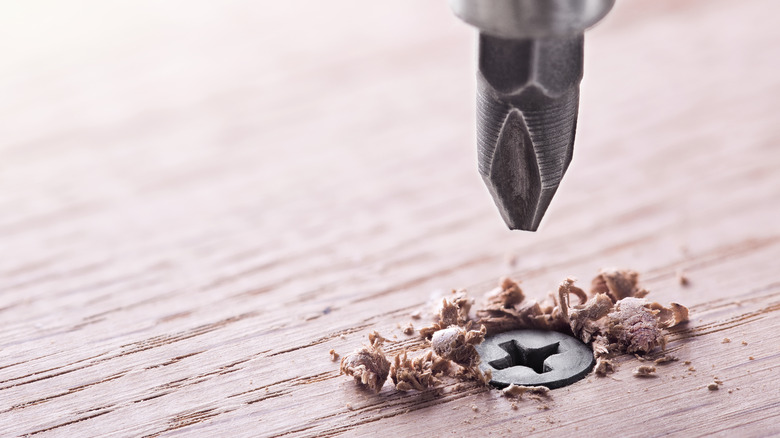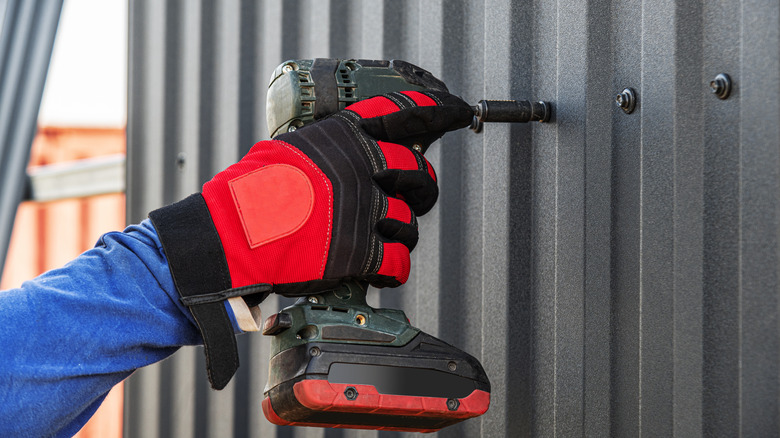What's The Right Screw For My DIY Project (& Does It Matter)?
When you walk through the typical DIYer's home examining the screws they use (to make this realistic, let's assume you're a father-in-law or home inspector), you'll usually find one of three situations: different types of screws are used randomly throughout all the projects; different types of screws are used correctly; or drywall screws are used for absolutely everything. Drywall installation? Use a drywall screw. Broken chair leg? Drywall screw. Reattaching stair railing? Drywall screw. Broken toothbrush? Drywall screw. But different screws have different reasons for being. Sometimes the reason is important, and sometimes you have to make your best guess about which screw to use.
If a particular task benefits from the use of a specific screw, you can usually tell by the screw's name. Drywall needs drywall screws, decks benefit from deck screws, and sometimes wood projects are best assembled with wood screws. Most of the time, little details matter, at least somewhat: the type of driver (e.g., square drive or Phillips head) used for the screw, the existence of an unthreaded shoulder, the size and spacing of threads, the material the screw is made of or coated with, and the size and shape of the head. But occasionally, it just doesn't matter. If you're building a little display stand for a baseball that will sit quietly on an indoor shelf, you can use any screw you can fit into the thing... so long as it doesn't split the wood.
When only a particular screw will do
There are two main circumstances in which you absolutely must use a particular screw–when it's required for the screw to function safely or when the right screw must be installed to begin with (or both). Fasteners meant to be used outdoors, like deck screws, will either be made of a corrosion-resistant material or will be coated with one so that a year or two of rust won't suddenly bring your DIY deck down to ground level one day. Hardened steel screws might be required for construction, while stainless steel or brass screws might be used for marine applications. Masonry screws might be heavy-duty affairs or lighter-duty fasteners, such as popular Tapcon screws, which have a variety of features critical to dealing with concrete, like a moisture-resistant coating that also reduces the amount of torque necessary or the ability to tap threads into pre-drilled holes.
It's also critical that you have the right screw for the job if literally no other screw can be installed. Masonry screws fall into this category, and so do self-drilling sheet metal screws used to attach things to metal without drilling pilot holes first, which are necessary because other screws simply won't penetrate the metal. Other examples are dowel screws (tapered screw threading on both ends), hanger screws (screw threads on one end, bolt threads on the other), and gutter screws.
How to choose a screw when it's not a life-or-death decision
As mentioned, screws don't tend to have irrelevant names; if you pick up a wood screw, there's a reason it's called that. Wood screws are a whole category of different fasteners with qualities to help you secure wood to wood (some have an unthreaded shoulder to allow for wood movement, for example). But in a lot of cases, a number of screws could do the job. Drywall screws and general-purpose construction screws are used for just about everything. In cases where rust and strength aren't an issue, you might choose any number of screws for a particular task, like using a screw hack for storing your hammers or adding weight to a soapbox racer.
The right one is a matter of examining the qualities required for the job. The screw should be the right length, of course, and it should have an appropriate diameter for the materials you're joining. The size of the screw's head matters, and it's usually proportional to the diameter of the threads and shank. One exception is the trim screw, which has a much smaller, unobtrusive head with less holding power. Screw heads come in many shapes as well; consider a flat head screw if you want the head flush with your workpiece or a pan head if flushness doesn't matter. Your choice of head will also inform the type of screwdriver you'll need for your DIY project.


